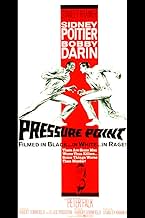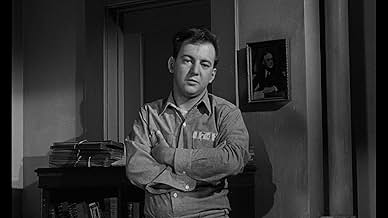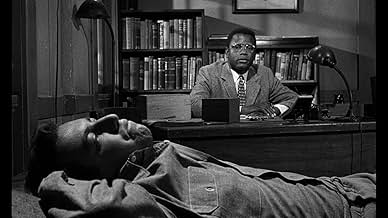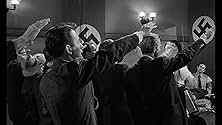Adicionar um enredo no seu idiomaA Black prison psychiatrist is assigned the distasteful task of helping a paranoid American Nazi charged with sedition.A Black prison psychiatrist is assigned the distasteful task of helping a paranoid American Nazi charged with sedition.A Black prison psychiatrist is assigned the distasteful task of helping a paranoid American Nazi charged with sedition.
- Direção
- Roteiristas
- Artistas
- Prêmios
- 1 indicação no total
- Father
- (não creditado)
- Bund Meeting Spectator
- (não creditado)
- Inmate
- (não creditado)
- Bund Meeting Spectator
- (não creditado)
- Patient
- (não creditado)
- Direção
- Roteiristas
- Elenco e equipe completos
- Produção, bilheteria e muito mais no IMDbPro
Avaliações em destaque
Poitier as always has a very authoritative presence and he and Darin work extremely well together. They have a lot of dialogue to deliver and completely immerse themselves in these troubled characters. Darin reveals enough depth here that people may wonder why he didn't pursue more serious roles. Cornfield creates some wonderfully stark atmosphere and stylish visuals, but never goes overboard, having the proper respect in the source material, a true case detailed in Dr. Robert M. Lindners' "The Fifty-Minute Hour". Some moments are quite memorable, such as the scenes with the patients' unloving father (James Anderson), a butcher. There's also an incredible scene of an epic session of tic-tac-toe that could have come off as silly but which has a powerful creepiness about it.
Overall, this is an effectively done little drama that isn't as well known as it ought to be. It's well worth seeing for the interplay between Poitier and Darin alone.
Eight out of 10.
Twenty years back from the Civil Rights era, at its height when Pressure Point was made, back to World War II Poitier is a prison psychiatrist who gets one bad patient. It's Bobby Darin who had never been seen like this on film, as a racist punk who belongs to the German American Bund. Although Darin and his band of thugs have done some really violent crimes, some of which we see in flashback, it's for sedition that he's been arrested.
Still a recurring nightmare brings him to the couch in Poitier's office and the two of them develop a curious relationship. Darin pushes all of Poitier's buttons, in fact he's a pretty loathsome type. Curing his nightmares will not necessarily make him one that will socially adjust back in society.
Film Historians have called Poitier things like Saint Sidney for the heroic good roles he played back in the day as the first black leading man in mainstream films. He might just have qualified for it here, even more than in his film debut No Way Out dealing with another racist criminal Richard Widmark, that time as a medical doctor.
It was Darin who showed the acting chops here that were never displayed before. He was nominated for his performance as a Best Supporting Actor in Captain Newman, MD., personally I think this is his best screen work.
Pressure Point is a two person work, the rest of the cast merely serves as background figures. I'm wondering though why someone like Peter Falk consented to a role that's confined to two scenes at the beginning and the end with no real opportunity for him to display his talents. Still for fans of Poitier or Darin or both this is a chance to see them both at their best.
This film is actually flashbacks in a flashback, but it works and is not confusing. It starts with a young psychiatrist (Peter Falk) charging into his boss' office (Sidney Poitier) and saying he cannot successfully treat the patient he has because the patient is black and hates him because he is white. Poitier responds by telling him that he really knows how he feels and tells the tale of how, in 1942, as a young psychiatrist, he treated an American Nazi (Bobby Darin) in a prison hospital who looked down on him because he was black.
Bobby Darin's character has been unable to sleep and has been passing out. The doctor probes into his past and finds the usual tropes of the abusive drunken dad and enabling mother who deals with the situation by becoming a hypochondriac. Darin's character grows up to be an abusive violent person himself, ultimately finding himself in the American Nazi party. Poitier's character correctly mentions that millions of people must have come from situations as bad as his patient, but have managed to conduct themselves without violent actions or delusions. I would mention the actual names of the characters, but the film simply calls the characters - Doctor, Patient, Jewish Girl, etc.
I won't say much more because I don't want to give away anything. This works because of the great dialogue and performances. Bobby Darin didn't make very many movies because of his short life, but this is a great chilling performance. Sidney Poitier gave many great performances in his long career, so I think this one is probably under appreciated because of that. Let me also mention the person who plays Darin's character as a child - Barry Gordon. He let's the viewer feel the loneliness and powerlessness of the character as a child, leading him to have a total lack of empathy as an adult.
Você sabia?
- CuriosidadesProducer Stanley Kramer directed the framing story, which refers to the present-day story that Sidney Poitier tells to Peter Falk.
- Erros de gravaçãoThe calendar visible on the wall of the Doctor's office in 1942 is not correct for that year. (It would be correct for 1962.)
- Citações
Doctor: [angrily to the Patient] This is my country! This is where I've done what I've done, and if there were a million cruds like you, all sick like you are sick, all shouting, 'Down, destroy, degrade,' and if there were 20 million more sick enough to listen to them, you are still gonna lose! You're gonna lose, Mister, because there is something in this country, something so big, so strong that you don't even know... something big enough to take it from people like you and come back and nail you into the ground. You're walking out of here? You are going nowhere! Now get out!
- Trilhas sonorasHere Comes the Bride
("The Bridal Chorus") (uncredited)
Composed by Richard Wagner (1850)
Sung at bund meeting
Principais escolhas
- How long is Pressure Point?Fornecido pela Alexa
Detalhes
Bilheteria
- Orçamento
- US$ 1.000.000 (estimativa)
- Tempo de duração
- 1 h 31 min(91 min)
- Cor
- Mixagem de som
- Proporção
- 1.85 : 1
































